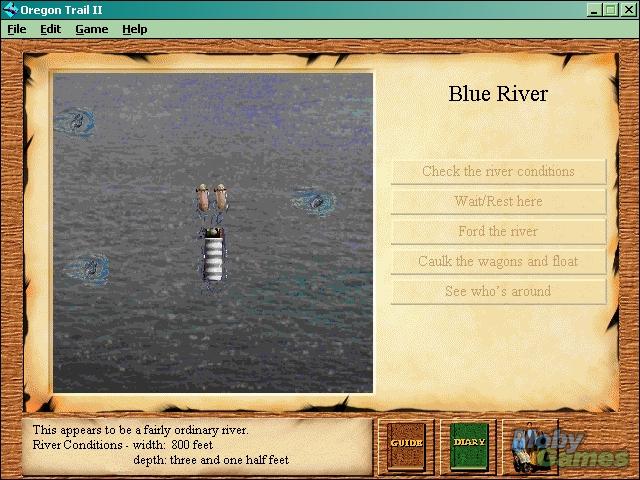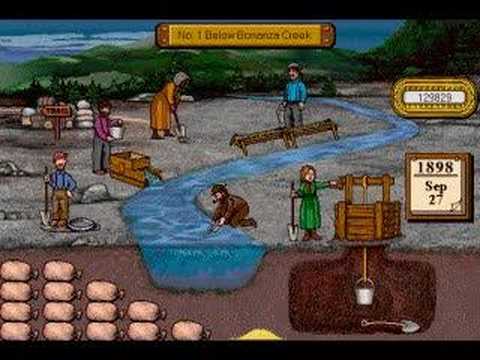Have you seen Meriwether? Probably not quite what what you’re looking for though…
Have you seen Meriwether? Probably not quite what what you’re looking for though…
Sounds like you want Oregon Trail 2. Where you ‘hunt’ by clicking, use arrow keys to Ford the rivers, and generally have a more interactive experience.

Though Yukon Trail is somewhat of a successor as well, and is more interactive. Mini games even!

I believe I still have my Oregon Trail 2 box. I played the heck out of that game. I loved it.
Well that looks interesting. Umm EA! You wound me sir! I’ll stick on my will they ever finish it list just the same ;-).
Organ Trail is a lot of fun too. Probably not too educational, unless you want to learn how to fight zombies. And stuff like State of Decay and Dead Rising can probably do that better.
How about Organ Trail :p
Haha. I don’t really miss the green version that much. My nostalgia is triggered by 2. Others have suggested the card game too, but I’ve heard it kind of sucks.
It’s… not great. Kinda dull, and ironically ammo is nearly useless. Which runs totally against the computer game where ammo was priceless.
Back on topic… I didn’t realize Club Penguin was still around. It’s unfortunate there aren’t more games that cater to all audiences, although clearly I wasn’t playing this one.
Yeah i have way too may games to play mediocre licensed ones on purpose. I’ve got a couple of those but they’re okish.
I would love to see some of these educational games come back though. I mean i still felt like they taught something even as imperfect as they were.
Where in the World is Carmen Sandiego is probably responsible, in no small part, for my love of geography. I had an old atlas from the 60’s that I would literally spend hours looking over, tracing rivers and mountain ranges.
Hell I still do that today, just using google maps!
Every game company I have seen go through hard times or fail was always down to one thing.
Increasing fixed costs beyond non predicable revenue.
I can be dressed up as a “growth strategy” but it is always the same thing that gets them. Its difficult because every new company or new game team must have this phase, you have to work in the red to make a new company for at least a short time obviously. Its after that when you are changing modes from “ok now we are profitable, lets work on becoming sustainable” is not easy and where its easy to fail.
Some alarm bell phrases that if you hear at your games company you should be terrified of.
“We cant recruit fast enough, we need to bring in more recruiters”
“We are focused on topline growth, profit will come later”
“Wall street likes … X” Insert anything with X, its always a mistake basing your company strategy on what analysts think.
“Business model Y is the winner in games., The consumer has spoken. All our games must be Y”
Err that list could go on a while :)
This is especially true because you need an outsized number of FTEs to increase your company’s game making capacity by just 1 per cycle (whatever that is for you). While you may have shared services and may not need to totally duplicate teams, if your company is trying to make more than one game at a time, chances are you essentially need to separate companies internally (for all intents and purposes) and that’s a huge financial risk in a changing marketplace with revenue that is anything but certain. I suspect the film industry is similar in that regard.
Good way of saying it. Yeah each new thing really is a new business venture and that funding should be rigorously examined ahead of time.
Given some of the companies you worked with, I’m sure you could ;)
Two letters that could tell a story…
I could :) to be fair to EA they are not the worst I have seen. EA’s worst sin with costs was (and maybe still is) allowing the teeth to tail ratio to become unbalanced.
IE: Hounding game teams/studios to laypeople off or slash costs & times, while at the same time having massive bloated finance, marketing, HR , production, sales & management orgs which in most cases dwarfed the number of people actually making games.
I remember one senior C level executive telling a certain EA CFO that to his face after being given his layoff number. “How many finance people will you be cutting?” The boardroom went rather silent.
This is based on 20+ year memory, but I think I remember Yukon Trail as being disappointing because ultimately your success depended on a single click for the location of your mine. Everything leading up to that point didn’t really matter and reaching the Yukon was pretty much a forgone conclusion, unlike OT1. Don’t remember playing OT2.
Not entirely. Now mind you, it’s been 20 years for me too, but it wasn’t so much whether you could reach it, but how soon. The better time you made, the more time you had to scout claims, the more time you had to work a claim after getting there. Because the ability to spend a week testing claims to find the better ones made a huge difference.
So the early game was all about optimizing your time and resources so that you could be in the best position to load the dice in your favor in the Yukon. It seemed nicely thematic that the difficulty waasnt getting there, but rather putting yourself in the best position to get lucky.
Some interesting perspectives on this Polygon feature

As the games industry gets more and more crowded, we look at what small teams are doing to stand out
When I go to games events here in Spain, the biggest stands are the ones for the universities, and everybody is trying to recruit students. If they were there back when I was younger, I would’ve joined them, and gone into debt. I’ve been to those universities to give speeches, like, ‘Look at this guy, who just in his room made a game and made it on Steam.’ I stopped doing that, because I felt like I was pushing a lot of young people to build companies and fail. These students have to pay $40,000 to go through all the studies. If you put five of those students together, that’s $200,000, and that’s a budget of 2-3 years here in Spain to prototype and experiment. Game development is an alchemy, not a science, and they want to use me as a poster boy to sell their degrees. There are now hundreds of dev studios here in Spain, and about around 10 of them are profitable.
What do you guys think? Hot take of the season? Or actual issue?
Also, what about those median numbers of income/sales generated? Reliable estimations or buttplug material? Looks like Steam is becoming more and more like the app stores, at least by just looking at the numbers.
Actual issue. Stats in 2017, there was a game coming out on Steam nearly every hour. In 2018, it’s probably increased, and we’re now at more than 1 game per hour.
Every day. All year long.
It’s mostly fine for consumers, it’s a flood, but it’s not hard to find good games in the flood. It’s pretty easy even. Not as fine for producers though. And with the SaS approach many games have taken, some games are doing all they can to monopolize your time. So… Yeah.
Jeff Vogel has been saying this for a couple of years now. I think he is 100% correct.
Wrt game industry vs tech industry in general, I don’t feel (anecdotally) that the tech industry in general goes as far into the red to the extent that game industry does. I’m familiar with people who have done both regular tech startups and game startups, and while some of the former are “optimistic” in their business plans, there is usually an actual business idea behind it that could make money. Not least because the investors who back such startups tend to be hard-nosed businessmen, who’re in it to make money - so if you’re just selling hot air, you’re going to find it hard to find the funding required to get your company of the ground (at least in the post dot.com world)
The game startups - even the successful ones - I’ve seen pretty much all passion projects, whose business idea tends to be 1) make game I like, 2) ??, 3) profit. On top of that, it’s often the developers themselves putting their money at stake, with little distribution of risk (except to the employees). That’s not really a healthy business approach if you want to survive.